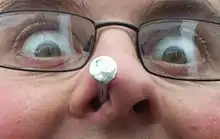.jpg.webp)


A human blockhead is a carnival or sideshow performer who hammers a nail or other implement (such as an ice pick, awl or screwdriver) into his or her nasal cavity via the nostril.[1]
Method
The stunt is often shocking to audiences, who believe that the nail is being hammered into the skull itself. In reality, the stunt plays on the anatomical misconception that the nasal cavity goes upward, rather than straight back.[1] The performer merely learns the terrain of the nasal cavity and lessens his or her sensitivity (and urge to sneeze) until the implement can be slid straight back through the nasal cavity until it hits the back of the throat.
The use of a hammer merely adds to the shock value by creating the illusion that the nail is being pounded through bone. One performer, Doc Swami, pushed the nail too far such that it got lost; however, shaking the head and blowing the nose can dislodge the nail.[1] Some performers have gone so far as to use a power drill.
History

This stunt is said to have been developed by renowned magician and sideshow performer Melvin Burkhart (1907–2001)[2][3] after his nose was broken in a boxing bout and he became fascinated by the way that the doctors inserted instruments into his nose. Since then, it has become one of the staple acts of the sideshow. Over the years, several variations of the act have been developed by numerous performers, using objects including running power drills, fireworks, lit fire-eating rods, condoms, balloons, cork screws, letter openers, straws, spoons, forks, and much more.
In 2005, scientific skeptic and investigator James Randi criticized faith healer John of God of Brazil for his use of this carnival trick to convince unsuspecting people, some desperately ill, of his paranormal healing powers.[4][5] Randi and others also criticized news media outlets ABC, CNN, and Oprah Winfrey for uncritically promoting the faith healer's quackery.[6]
On November 23, 2009, The National Geographic Channel's Humanly Impossible series aired an episode "Human Blockhead" examining this trick with a visual camera probe inserted through the nostril and up to four inches into the sinus cavity.[7][8]
One example of a variation of the original Human Blockhead act is the "Human Meathead", created in 2000 by Ryan Stock. The performer displays a large meat hook and then proceeds to force it into the nostril, through his nasal cavity and out his mouth. When performing this stunt, Ryan Stock has said that he had suspended up to 70lbs from the end of the inserted hook.[9]
See also
References
- 1 2 3 Nickell, Joe (2005). Secrets of the sideshows. Lexington, Ky.: University Press of Kentucky. ISBN 0-8131-7179-2. OCLC 65377460.
- ↑ Elizabeth Gilbert: The Lives They Live: Melvin Burkhart, B. 1907; Life as a Blockhead, The New York Times, Dec. 30, 2001
- ↑ Douglas Martin: Melvin Burkhart, 94, 'Human Blockhead', dies, International Herald Tribune, Nov. 19, 2001
- ↑ Randi, James (October 6, 2014). "From the Archives: Randi's inside scoop into ABC News' 'John of God' investigation (2005)". James Randi Educational Foundation. Retrieved March 31, 2020.
- ↑ "Accused charlatan 'healer' 'John of God' coming to Australia". Doubtful News. October 4, 2014. Archived from the original on September 26, 2017. Retrieved March 31, 2020.
- ↑ Gorski, David (November 22, 2010). "How low can Oprah Winfrey go? Promoting faith healer John of God to the masses". Science-Based Medicine. Retrieved March 31, 2020.
- ↑ "Human Blockhead". National Geographic Channel. Archived from the original on November 27, 2015. Retrieved March 31, 2020.
- ↑ "National Geographic Videos - Season 200911". TV.com. Retrieved March 31, 2020.
- ↑ "Freak out!". Edmonton Journal. July 17, 2004. p. 90. Retrieved March 31, 2020 – via Newspapers.com.